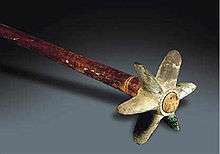Macana
The term macana, of Taíno origin, refers to various wooden weapons used by the various native cultures of Central and South America.
The earliest meaning attributed to macana is a sword-like weapon made out of wood, but still sharp enough to be dangerous.[1] The term is also sometimes applied to the similar Aztec weapon, which is studded with pieces of obsidian in order to create a blade, though some authorities distinguish this item by using the Nahuatl name macuahuitl.

In the Andes, the Spanish conquistadors applied the term "macana" to the several blunt-type weapons at the disposal of the Inca army's arsenal, particularly to the Chaska chuqui (lit. star spear) and the Chambi (mace) weapons which consisted of a wooden shaft with a heavy metal (copper or bronze) or stone object at the end. As its name suggests, the Chaska chuqui tip was in a star shape to maximize the potential to break bone. They were the most common weapon in the Inca arsenal, and it is possible that gold or silver was used for the star for high-ranking officers.[2]
In modern Spanish the word has broadened to refer to various types of blunt wooden weapons, especially a police nightstick, with a shape very similar to Okinawan tonfas.
Notes
- Peter Martyr d'Anghiera, Decades de Orbe Novo (written in the early 16th century):
- Cominus hi certant vt plurimum, ensibus oblongis, quos macanas ipsi appellant, ligneis tamen, quia ferrum non assequuntur...
- "In hand to hand combat they generally use long swords, which they call macanas, which are however made of wood, as they don't have knowledge of iron." (p. 127)
- armatum ... arcubus putà & sagittis, machanísque, id est, ensibus amplis, ligneis, oblongis, vtráque manu agitandis...
- "...armed ... for example with bows and arrows, and macanas—that is, with large, wooden, long swords which are wielded two-handedly" (p. 180)
- Rowe, John Howland (1946). Inca Culture at the Time of the Spanish Conquest. U.S. Government Printing Office.
External links
| Wikimedia Commons has media related to Macanas. |
- Pictures from the Codex Ixtlilxochitl featuring the macuahuitl. (Spanish)
